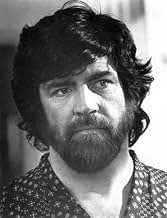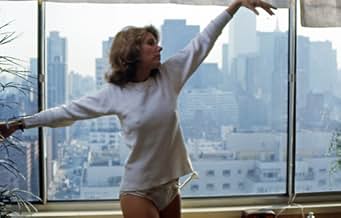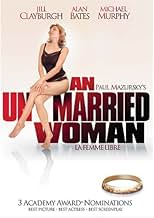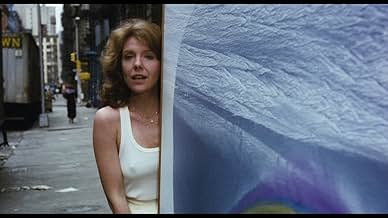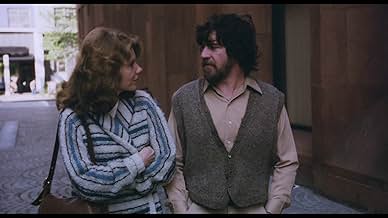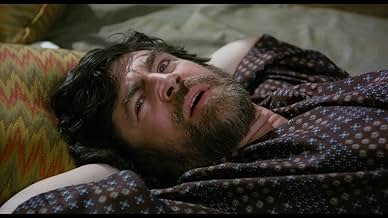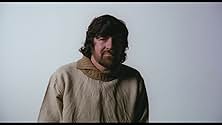Ajouter une intrigue dans votre langueA Manhattan woman struggles with her identity as she tries to move on from a painful divorce.A Manhattan woman struggles with her identity as she tries to move on from a painful divorce.A Manhattan woman struggles with her identity as she tries to move on from a painful divorce.
- Nommé pour 3 oscars
- 6 victoires et 18 nominations au total
- Sue
- (as Pat Quinn)
- Cabbie
- (as Chico Martinez)
Histoire
Le saviez-vous
- AnecdotesDr. Penelope Russianoff, who plays Erica (Jill Clayburgh)'s therapist Tanya, was an actual practicing psychologist. The counseling sessions were filmed in her actual penthouse apartment on West 86th Street in New York, where she saw her patients. She worked for two and a half days and was paid US $2500. She was cast after having been recommended to director Paul Mazursky by "Girlfriends" (1978) director Claudia Weill. Russianoff said that she improvised most of her dialogue, which was based on the type of therapy she gave her patients. After the movie was launched, Russianoff became a mini-celebrity. She said the role gave her "instant celebrity-hood," being recognized on the streets of New York, where she signed autographs, and got a number of new clients. She wrote several self-help books in the 1980s, including "Why Do I Think I Am Nothing Without a Man?" (1988), a book first published about a decade after this film, but with a title and subject matter that were reflective of this picture.
- GaffesThe boom is clearly visible for several seconds during the art gallery scene.
- Citations
[first lines]
[Martin and Erica are jogging along the river]
Martin: Jesus Christ! Look at this! My sneaker's ruined!
Erica: They're only $35.
[Erica takes Martin's shoe and cleans it off for him]
Martin: Fucking city's turning into one big pile of DOG SHIT!
[shouting at passing traffic]
Martin: Come on out and take a crap on me--everybody else is. Fuck!
[Martin lights a cigarette]
Erica: ...been jogging for 2 1/2 miles - you're giving yourself lung cancer.
Martin: I'll tell you something, Erica: the longer I'm married to you, the more you sound like my mother.
Erica: Clean your own sneaker.
[throws shoe at Martin]
Martin: I think you wanted me to step in it.
Erica: [laughing] You're going crazy, Martin.
Martin: I am?
Erica: [laughing] Yes.
[Martin tosses his shoe over his shoulder into the river. Erica jogs away, and Martin jogs after]
- Générique farfeluFor Betsy
- Bandes originalesSwan Lake, Op.20
(1877) (uncredited)
Written by Pyotr Ilyich Tchaikovsky
Excerpts danced by Jill Clayburgh
The mid to late 70s was New York's era as the 'fashionable city' in the days of fashionable cities. NYC took the torch from Swinging Sixites London as the city every fashionable person wanted to go to, live in, know... It was the 'Disco' capital of the world. It was where the most interesting films were set. It where all the happening artists lived and Unmarried Woman caught the zeitgeist of that time. Even jogging was a new phenomenon back then and NY lead the way with it and 'everyone' wanted to know what people were up to there, even about the jogging. If you'd never been to NYC you were missing out. If you had been to NY and or knew NY, back in 1978, you bragged about it. While at the same time the city was officially broke and in many ways seemed to be crumbling into the sea.
Unmarried Woman was a product of all this fascination, both negative and positive, with the city at the time. Trivial details about life in NY had a sort of cachet. Therefore, on reflection, what may seem trite to viewers today, had a strange sort of value back then.
Some people sneer at Erica's seemingly privileged position in society. How dare she be so miserable, have you seen where she lives? Well, guess what, wealthy women also feel sad when they are rejected by their husbands for a younger model. And guess what, some people like to look at the lives of people who live in beautiful apartments with views of the river and whizz downtown in yellow cabs on bright New York mornings. In fact it's the contrast between the material privilege and the sadness and loss that makes this film work.
Some people are also alarmed by the strong, upfront musical score. Sorry about that. Music in the 70s was strong and upfront in our lives, not just background noise. The wailing saxophone was the pop instrument of the time and the excellent, very 70s soundtrack, is one of the aspects that make watching this film such a powerful, nostalgic and enjoyable ride.
Unmarried Woman does have its flaws. It is at times somewhat simplistic and personally, I'm not so sure that newly unmarried woman, Erica, was as much of a catch as we're made to believe. Every man she meets seems to fall at her feet.
This is very much a film of its time and a very interesting time and place it was. I wish they still made films like this today, about adults, for adults, with strong subtle performances, without both eyes on the cash register and without some dreary, over-exposed, under talented box office 'star' drudging her way through her lines. There was something very adult and sophisticated about American cinema in the 70s and Unmarrried Woman takes its place in the long list of films that were a part of that.
The film was beautifully shot, beautifully scored, excellently acted and I'm glad it's now available for us to see, as a reminder of a short but memorable time and place.
- Shilpot7
- 25 mai 2010
- Lien permanent
Meilleurs choix
- How long is An Unmarried Woman?Propulsé par Alexa
Détails
- Date de sortie
- Pays d’origine
- Langue
- Aussi connu sous le nom de
- An Unmarried Woman
- Lieux de tournage
- sociétés de production
- Consultez plus de crédits d'entreprise sur IMDbPro
Box-office
- Brut – États-Unis et Canada
- 24 000 000 $ US
Contribuer à cette page



